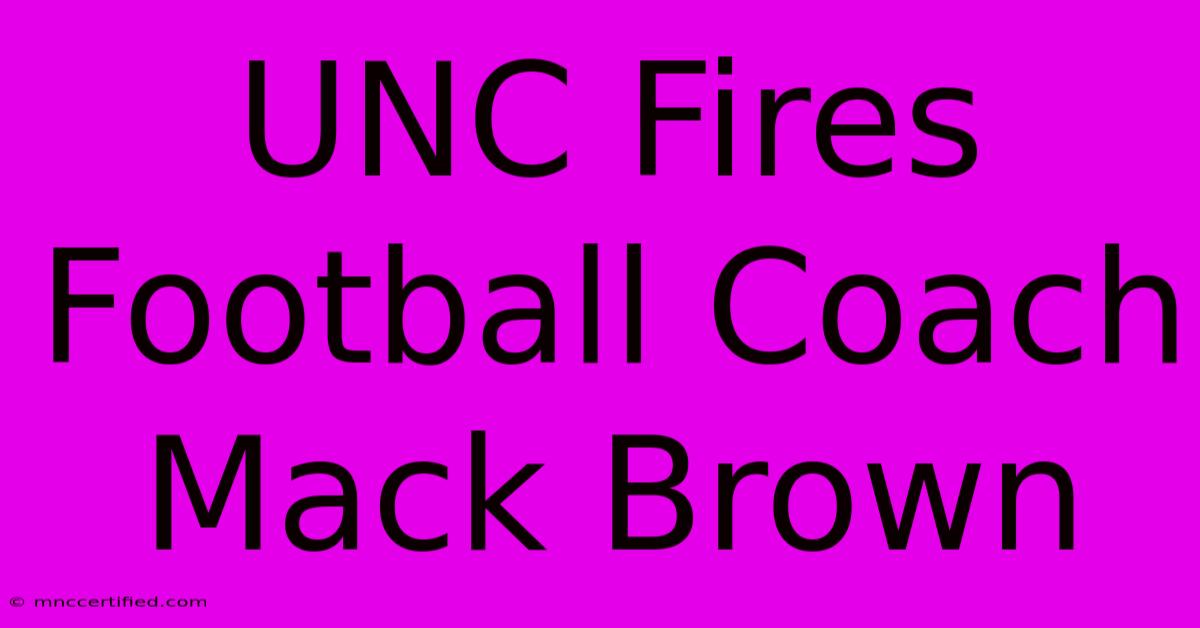UNC Fires Football Coach Mack Brown

Table of Contents
UNC Fires Football Coach Mack Brown: A Shock to Chapel Hill
The college football world was rocked on [Insert Date of Firing Here] when the University of North Carolina at Chapel Hill announced the firing of its long-time head football coach, Mack Brown. This unexpected move sent shockwaves through the Tar Heel fanbase and the wider collegiate sports landscape, leaving many wondering what led to this abrupt end to a seemingly successful tenure.
The Mack Brown Era at UNC: A Rollercoaster Ride
Mack Brown's return to Chapel Hill in 2019 was met with immense enthusiasm. He brought with him a wealth of experience, having previously led the University of Texas to a national championship. Initial seasons showed promise, with improved recruiting and a renewed sense of optimism surrounding the Tar Heel football program. However, the program's performance fluctuated, showcasing both flashes of brilliance and stretches of inconsistency.
Key Highlights and Low Points:
- Early Successes: Brown initially revitalized the UNC football program, securing impressive wins and demonstrating improved player development. His ability to connect with recruits and build strong relationships played a significant role in early success.
- Recruiting Challenges: Despite initial success, recruiting remained a constant challenge, particularly in competing with powerhouse programs within the ACC and nationally. This factor likely played a role in the team's inconsistent performance.
- Inconsistent Season Results: While the Tar Heels experienced some successful seasons, ultimately the on-field results did not consistently meet expectations set by the university's administration and fanbase. A series of disappointing seasons likely contributed to the decision.
- Recent Setbacks: The [mention specific recent poor performance, e.g., losing season, bowl game loss, etc.] proved to be the final straw, highlighting the persistent issues within the program.
Reasons Behind the Firing: More Than Just Wins and Losses
While on-field performance undoubtedly played a significant role, the decision to fire Mack Brown likely involved a multitude of factors beyond simply wins and losses. These could include:
- Recruiting Struggles: The inability to consistently secure top-tier recruits against stiff competition likely weighed heavily in the university's assessment.
- Lack of Sustainable Success: While there were moments of brilliance, the program failed to achieve consistent, long-term success, failing to reach the pinnacle of the ACC or compete nationally on a sustained basis.
- Administrative Pressure: The pressure to deliver consistently strong results in a highly competitive athletic conference like the ACC is immense. Brown's tenure ultimately may not have aligned with the administration's expectations.
- Financial Considerations: The significant financial investment in the football program requires a strong return on investment, both on and off the field. This might have been a factor in the university's decision-making process.
The Future of UNC Football: A New Era Begins
The firing of Mack Brown marks the beginning of a new chapter for UNC football. The university will now embark on a search for a new head coach, a process that will undoubtedly attract significant interest from across the college football landscape. The next coach will inherit a program with potential but also significant challenges. Success will require a comprehensive approach, focusing on recruiting, player development, and building a strong coaching staff.
Potential Challenges for the Next Coach:
- High Expectations: The UNC fanbase has high expectations, and the new coach will need to quickly establish a winning culture to satisfy those demands.
- Competitive ACC: The ACC is a highly competitive conference, making it challenging to achieve consistent success.
- Recruiting Landscape: The landscape of college football recruiting is incredibly competitive. The new coach needs to excel at attracting and securing talented players.
The firing of Mack Brown is a significant event in UNC football history. While his return brought initial excitement, the ultimate outcome signifies the demanding nature of high-level college athletics and the constant pressure to achieve sustained success. The university’s decision undoubtedly reflects a desire for a more consistent and competitive future for the Tar Heel football program.

Thank you for visiting our website wich cover about UNC Fires Football Coach Mack Brown. We hope the information provided has been useful to you. Feel free to contact us if you have any questions or need further assistance. See you next time and dont miss to bookmark.
Featured Posts
-
Trumps Tariffs A Deeper Purpose
Nov 27, 2024
-
Wendy Williams Health Update
Nov 27, 2024
-
Iowa Homeowners Insurance Laws
Nov 27, 2024
-
Rare Sighting Freeman At Giorgios
Nov 27, 2024
-
Everest Indemnity Insurance Co
Nov 27, 2024